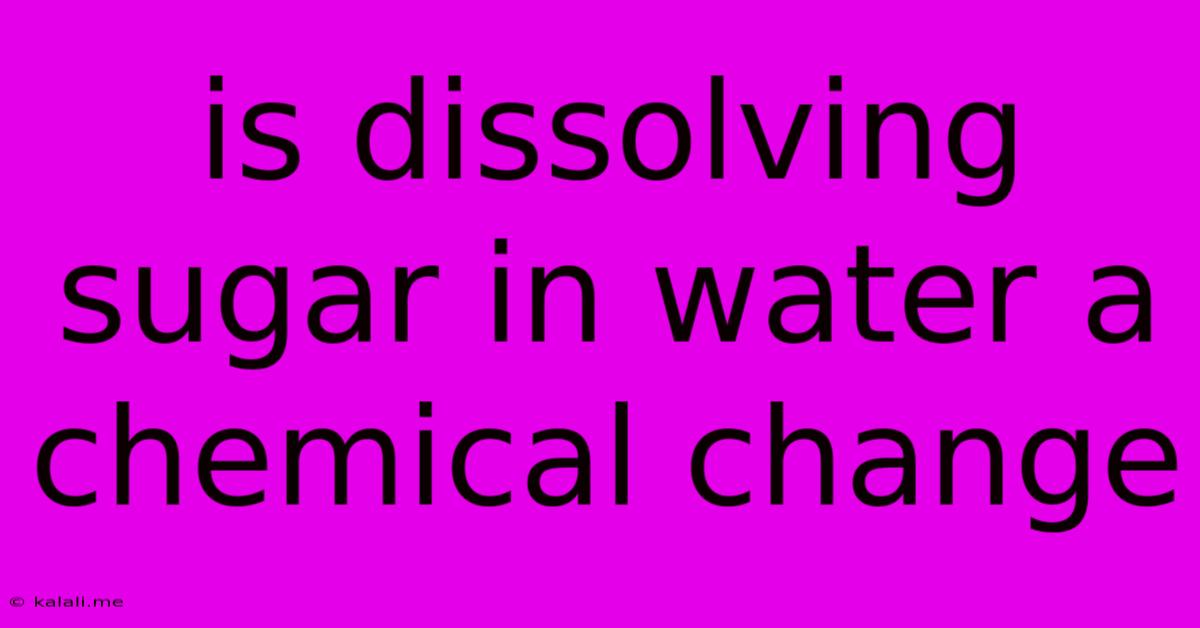Is Dissolving Sugar In Water A Chemical Change
Kalali
Jun 07, 2025 · 3 min read

Table of Contents
Is Dissolving Sugar in Water a Chemical Change? A Detailed Look
Is dissolving sugar in water a chemical change or a physical change? This seemingly simple question often sparks debate, even among those familiar with basic chemistry. Understanding the difference between chemical and physical changes is crucial for grasping fundamental chemical concepts. This article will explore the process of dissolving sugar in water and definitively answer whether it constitutes a chemical change. The short answer is no, it's a physical change. But let's delve deeper to understand why.
What Differentiates Chemical and Physical Changes?
Before examining the sugar-water solution, let's establish clear definitions:
-
Chemical Change: A chemical change, or chemical reaction, involves the formation of new substances with different chemical properties. This usually involves the breaking and forming of chemical bonds, often accompanied by observable changes like color change, gas production, or precipitation. The original substances are fundamentally altered.
-
Physical Change: A physical change alters the form or appearance of a substance but doesn't change its chemical composition. Changes of state (melting, freezing, boiling, condensation), dissolving, and mixing are examples of physical changes. The chemical identity of the substances remains the same.
Analyzing the Sugar-Water Solution
When you dissolve sugar (sucrose) in water, the sugar crystals break down into individual sucrose molecules. These molecules disperse evenly throughout the water, forming a homogeneous mixture called a solution. However, the sucrose molecules themselves remain unchanged. No new chemical bonds are formed, and no new substance is created.
Here's why it's a physical change:
-
No new substance is formed: The sugar and water retain their original chemical identities. You can easily recover the sugar by evaporating the water; the sugar remains sucrose.
-
Chemical bonds are not broken or formed: The process involves the interaction of polar water molecules with the polar sucrose molecules, leading to the dissolution. This interaction is based on intermolecular forces (hydrogen bonds), not the breaking or forming of covalent bonds within the sucrose or water molecules.
-
Reversible process: Evaporation of the water reverses the process, returning the sugar to its crystalline form. This reversibility is a hallmark of physical changes.
Common Misconceptions
Some might argue that a change has occurred, as the sugar's appearance and properties have changed. However, this alteration is merely a physical transformation, not a chemical one. The sugar is still chemically sucrose; its physical state has merely changed from a solid crystal to dissolved molecules.
Examples of Chemical Changes for Contrast
To further clarify, consider these examples of chemical changes:
-
Burning wood: Wood reacts with oxygen to produce ash, carbon dioxide, and water. The original wood is transformed into entirely new substances.
-
Baking a cake: The ingredients undergo chemical reactions, creating new compounds that give the cake its texture and taste. You cannot easily reverse this process to retrieve the original ingredients.
-
Rusting iron: Iron reacts with oxygen and water to form iron oxide (rust), a completely different substance.
Conclusion:
Dissolving sugar in water is unequivocally a physical change. The sugar molecules disperse in the water, but their chemical structure and identity remain unchanged. This process involves physical interactions, not chemical reactions. While the appearance and properties might change, the fundamental chemical composition of both the sugar and the water remains the same. Understanding this distinction is essential for a solid grasp of basic chemistry principles.
Latest Posts
Latest Posts
-
You Shall Not Have Other Gods Before Me
Jun 08, 2025
-
Did Mary Ride A Donkey To Bethlehem
Jun 08, 2025
-
How To Take Grout Off Of Tile
Jun 08, 2025
-
Does A For Loop Use More I O Or Cpu
Jun 08, 2025
-
How Do I Find My Companys Vpn On My Laptop
Jun 08, 2025
Related Post
Thank you for visiting our website which covers about Is Dissolving Sugar In Water A Chemical Change . We hope the information provided has been useful to you. Feel free to contact us if you have any questions or need further assistance. See you next time and don't miss to bookmark.